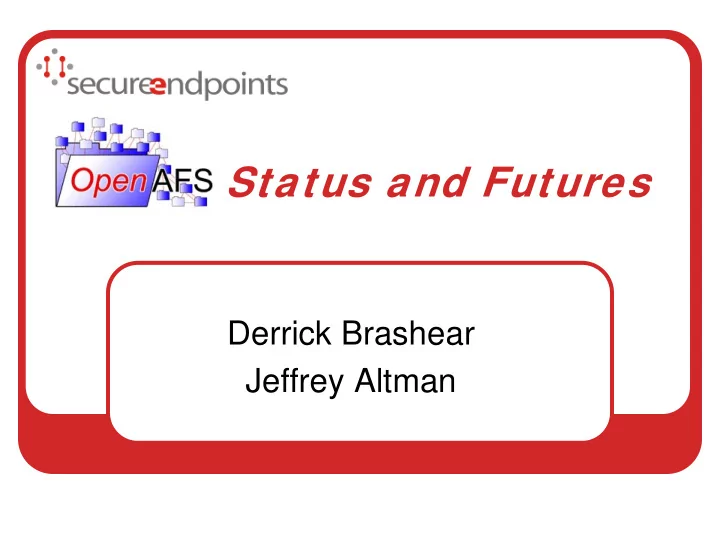

Status and Futures Derrick Brashear Jeffrey Altman
What is OpenAFS? � OpenAFS is a global, federated, location independent open source storage system that provides pervasive data access from a broad range of heterogeneous devices scaling from handsets to super computers.
OpenAFS Status Broad platform support � • UNIX • MacOS 10.3- 10.5 , Solaris (Sparc and x86) 7- 11 and OpenSolaris • AIX 5.1-5.3; HPUX 11.0, 11i, 11i v2, 11i v3; IRIX 6.5; • NetBSD, FreeBSD and OpenBSD (server only) • Linux 2.4 and 2.6 (through .24) kernels • Fedora Core 3-7, RHEL3-5, Debian and others • Microsoft Windows • 2000, XP, Server 2003, Vista, Server 2008 • (32-bit and 64-bit) 180 Public Cells (and an increasing number of known private cells) � Growing number of developers � • Partnerships with academic CS departments
Common Usage Models � Pervasive data access • Home directories, project data, … accessible from anywhere, from any device � Federated collaboration � Read-only publication � Context-aware application deployment � Distributed computing
OpenAFS Strengths � WAN friendly � NAT capable � Authentication, Authorization, and Auditing � Change notifications � Distributed administration � High availability • Maintenance without downtime � Data consistency
What Makes OpenAFS Unique? � It’s the cache manager • Intelligent caching • Automatic cell and volume discovery • @sys context sensitive name replacement • Pre-fetching • Disconnected operations • Limited read-only in Windows client • Local directory updates • Very large cache support (25GB or greater)
Future Cache Manager Enhancements � Object Storage Referrals � Read-write disconnected mode � Automated tuning of cache size and object allocations � Windows • Unicode support • Native Redirector client � Privacy for anonymous access � Pass-through file access � Cache usage limits • Read-only vs Read/write • Local vs Remote
Where is OpenAFS in the Technology Adoption Life Cycle � Over the last seven years since IBM declared end-of-life and released AFS to the open source community, the product has returned to an early adopters phase in which only visionaries commit to the technology. � OpenAFS is rapidly re-approaching “the Chasm” which can be crossed only by producing the 100% solution for a specific target audience.
The Need for Pragmatism When Selecting a Storage Solution � Access to data is the most important building block of an IT organization � Once a storage solution is deployed and populated, migrating to another solution is nearly impossible � Confidence in the long term availability and success of your existing solution is key. � If there is no confidence, start planning your migration today. It will take ten years!
CRITERIA OPE OPENAF AFS OPE PENAF NAFS NOTES LUSTRE LUSTRE NOT NOTES NFS V4 S V4 NF NFS V S V4 NO NOTES Single namespace Yes Defaults to /afs. No Planned for 1.8. Extension Not widely available. Clients support per-file ACLs File Access Control Directory POSIX acls. File Superset of POSIX acls. Limited support for serving Serve from up to 400 Distributed Architecture Yes Yes Yes Can serve any filesystem. any (existing) filesystem. Object Storage Servers. Windows servers available Hummingbird Maestro Server platform support Broad Linux Solaris planned. Broad Windows Server but not supported Transparent movement of Online data migration Volume Management Yes No Extension Not always available Filesystem snapshots Limited Typically one “backup”. No Planned for 3.0. No Granular to container Implemented by the Quotas Yes Yes No (“volume”) level. backend. POSIX Extended No Planned. Yes Yes Locking Advisory Whole file only. Yes No lockf/flock yet. Yes Mandatory and Advisory. Transport UDP IPv4 TCP support planned. TCP IPv4 TCP IPv6 not widely available. Replication Read-Only Read-Write planned. Local RAID, not multi-server yet. Extension Not widely available. Disconnected Mode No In progress No Planned for 1.8. No Object Storage No Integration to begin soon. Yes That’s largely the point! Extension In pNFS/NFS v4.1. Location of Object Storage Referrals offer limited Location Transparency Yes Even cross-installation. Yes No Servers is transparent. functionality. Security Yes 56 bit fcrypt. No Planned for 1.8. Yes GSSAPI RPC. Authentication Yes Kerberos 4 and Kerberos 5. No Kerberos support in Lustre Yes GSSAPI / Kerberos 5. Windows, Mac, Linux, most Limited Windows pCIFS Proprietary Windows Multiplatform Yes No Yes client; Not in MacOS Unix variants. client. No Mac client yet. Thousands of clients per Scalability Yes Yes 30000 clients per node. Yes server in practice. No parallel access today. Optimized; Uses object- pNFS extension, TCP Performance Moderate High Varies Limited by transport. based storage. allow good performance. Available Citi reference Open Source Yes IBM Public License V1.0. Yes GPL. implementation is GPL. Secure Endpoints, Sine Commercial Support Yes Yes ClusterFS (now Sun). Yes Typically from OS vendor. Nomine Associates.
Why OpenAFS Should Be In Your Future? � OpenAFS has • demonstrated the ability to adopt to new platforms • Windows Vista and Server 2008 • MacOS X Leopard • Linux 2.6 • Solaris 11 • an active community • operating system vendor enthusiasm • increasing forward momentum
How Does OpenAFS Achieve the 100% Solution? � http://www.openafs.org/roadmap.html • Enhance the protocol and server data structures • Become a first class file system for MacOS X, Windows, and beyond • Dramatically improve server throughput by implementing asynchronous events • Reduce the cost of replicating large files and volumes • Develop innovative user interfaces that make AFS content readily accessible and searchable • Further address the needs of the pervasive computing model • Port Servers to Windows Server 2003/2008
How Can the High Energy Physics Community Help OpenAFS? • Communicate your needs • Assist us in obtaining resources to address them • Development contracts • Grants • Developer time • Testing Resources • Documenters • Language Translators
Q& A Further questions can be addressed to openafs-elders@openafs.org
Thank You! Hope to See You at the Workshop � AFS & Kerberos Best Practice Workshop � May 19-23 � Newark, New Jersey, United States � Hosted by New Jersey Institute of Technology
Recommend
More recommend